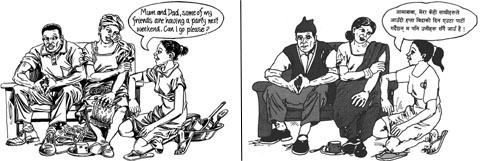NEWS
Called to Care workbooks: from Africa to Asia
A workshop participant describes her experiences with her adolescent daughter.
By: Glen Williams.
In Nepal two CALLED TO CARE workbooks, developed in Kenya and Malawi, are now being used with faith leaders, school pupils and parents.
Sakriya Sath – the publisher of these workbooks – is a Nepalese NGO and publisher of educational and training materials on topics such as sexual and reproductive health, with a special focus on the information needs of poor, marginalised and disadvantaged communities. It is particularly dedicated to the production of training materials in the national language, Nepali.
With financial support from the Evangelical Lutheran Church in America (ELCA) and technical support from the Strategies for Hope Trust, Sakriya Sath published Nepali editions of both these workbooks in December, 2014.
For the past 18 months, Sakriya Sath has been distributing these workbooks to local schools, faith communities and NGOs, and also training teachers, religious leaders, parents and community leaders in how to use them most effectively. Prominent religious leaders have also spoken at public meetings organised to introduce both workbooks to their faith communities.

Hindu, Christian, Buddhist and Muslim leaders have warmly endorsed both CALLED TO CARE workbooks.
Workbook no. 8, My Life – Starting Now, is designed to help young people improve their self-esteem, build good relationships, make well-informed decisions, live a healthy lifestyle, provide care and support to others, and resist negative peer pressure. One section of the workbook explores the meaning of ‘love’ in its various forms. It also places special emphasis on sexual and reproductive health as part of the process of growing up.
Workbook no. 10, Parenting: a Journey of Love, was developed to support parents and other people playing a parenting role with children and adolescents. Part One outlines basic information about five key parenting roles, based on an approach developed by the World Health Organization. Part Two consists of guidelines for training biological parents, grandparents, guardians and other people acting in parental roles, including orphans who are themselves household heads.
However, these workbooks are not simply Nepali translations of the English language originals. First, all the illustrations in both books were adapted so they depicted Nepalese people rather than Kenyans and Malawians.

Illustrations from the original English language editions of both Called to Care workbooks were adapted for Nepalese readers.
Second, before publishing the Nepali translations, Sakriya Sath consulted with local religious leaders on the acceptability of the texts, which contained quotes from the Bible. Local Church leaders were happy with the Biblical quotes, but local Hindu, Buddhist and Muslim leaders asked if the workbooks could also include quotes from their own holy books. After consulting with ELCA, Sakriya Sath agreed to make these changes. As a result, the workbooks now contain quotes not only from the Bible, but also from the holy books of the Hindu, Buddhist and Muslim faiths.
In May 2016, Sakriya Sath commissioned an evaluation of the project by a local consultant, Dr D. P. Paudel, who interviewed 150 people who had participated in training activities using one or other of the two workbooks. He found that, for 95% of the people interviewed, this was the first time they had ever experienced this type of training. Moreover, 84% found the training sessions “very helpful”, 5% found them “helpful” and 8% found them “good”. The sessions in workbook no. 10 about relationships between parents and children were found to be particularly popular and helpful.
In his conclusions, Dr Paudel praised the project for providing “informed, practical support to children and young people who are going through emotional changes and making key life decisions. It also provides valuable support for their parents and guardians, who are often poorly prepared for their parental roles.” He also recommended that the training sessions should be broadened to include people from a wider variety of communities and areas, that the sessions should be held more frequently, and that the training programme should be expanded to national level.
A copy of the evaluation report is available from Sakriya Sath (Sunita Timalsina): .(JavaScript must be enabled to view this email address).
Click here to see also the photo gallery.
 Hindu, Christian, Buddhist and Muslim leaders have warmly endorsed both CALLED TO CARE workbooks.
Hindu, Christian, Buddhist and Muslim leaders have warmly endorsed both CALLED TO CARE workbooks.








